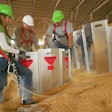Happy 2011! As we all gladly welcome this new year of opportunity, we as an industry have to be cognizant of political and market trends — both domestically and abroad — to be able to capitalize on and maintain agriculture's momentum.
In early December I attended my first National Feed & Grain Association's Annual Country Elevator Conference. The dynamic and informative line-up of speakers touched on everything from hot-button regulatory issues to the financing tools; however, there seemed to be an especially strong emphasis on economics.
The 39th edition of the event was held in Indianapolis and featured Indiana's governor Hon. Mitch Daniels (R-IN) as the keynote speaker. Daniels surprised me with his candor and his optimistic tone shed light on the current state of government in Indiana. Characteristic to the the rest of the nation, job growth and the financial health of the economy are pressing issues.
In the wake of the most recent unemployment report, Daniels suggested the United States must embrace a progressive pro-growth outlook — a comment he feels is "not a political statement, it's a mathematical statement."
He noted that while the strengths of agriculture have been highlighted during this period of economic struggle, in general, enthusiasm for agriculture is learned and not automatic; however, it is viewed as an important chapter in [Indiana's] strategy to build a better state.
With the shift of power in Congress, many are left wondering legistlation will effect agriculture between now and the 2012 election.
Since economists suggests our economy needs to grow 3.4% annually (a feat not accomplished since the 1950s) to avoid disaster, Daniels suggests the government should align everything for full growth. Noting issues like unnecessary regulation should take a back seat to achieving these objectives and taxation that encourages growth in the private sector.
"What can [we] do — do better — to make sure the next job happens here and not somewhere else," Daniels said. "Get that right and the other problems will take care of themselves. We can argue later about what we're spending tax dollars on, right now we need to focus on getting and staying on track."
Economist James Wiesemeyer, senior vice president of informa economics, predicts a lot of the attention will sway toward addressing the "mega-trends" in agriculture: growth in the world's population; growing wealth, weather's impact on production; and the need for alternative energy feedstocks.
Noting that when you review the history of the United States, we're no stranger to the ebb and flow of the economy, James Glassman, managing director and senior economist with JPMorgan Chase & Co., he suggests looking to the world's emerging economies for future growth domestically.
"We must use imagination to get the economy back on track, and those thinking of opportinities will be ready once the tide rises," Glassman says.
Many of the positions taken by the speakers are reflected in NGFA's Policy Priorities for 2011, as outlined by NGFA chairman Hal Reed. To review NGFA's 2011 priority policies, visit it's News & Issues page at ngfa.org/ngfa_news.
Best wishes for the year ahead!




















